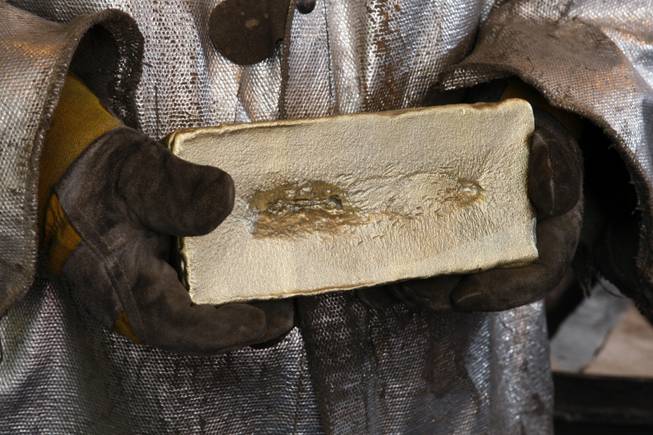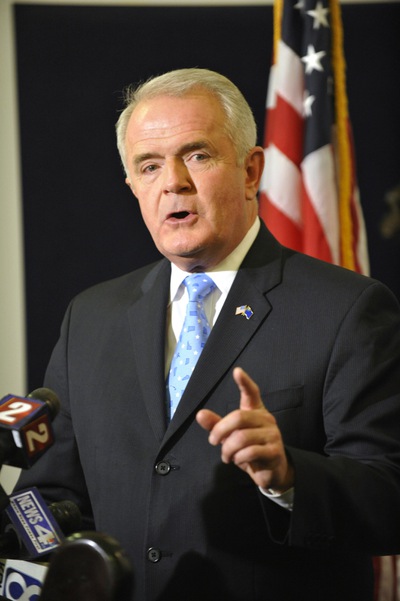
Steve Marcus / FILE
Friday, Feb. 19, 2010 | 2 a.m.
Related Documents (.pdf)
Sun Archives
- Politicians face no-win situation as they tackle state budget (2-17-2010)
- Governor’s plan: Layoffs, pay cuts, tax loophole closures (2-16-2010)
- Hundreds attend town hall meeting to weigh in on state budget crisis (2-13-2010)
- Gibbons seems to be backsliding on pledge to not raise taxes (2-13-2010)
- Two Democrats break ranks, call for state tax hikes (2-13-2010)
- Gibbons to sign proclamation Tuesday calling for special session (2-12-2010)
- Crackdown on uninsured drivers weighed to help fill state budget gap (2-11-2010)
- Governor plans emergency address on Nevada budget (2-7-2010)
- Governor’s speech will lay out state’s budget problems (2-7-2010)
- State budget comes up $800 million short (1-22-2010)
- Forecast: Economy will begin to rebound in mid-2011 (1-22-2010)
- Gibbons’ no-talk order further divides branches (1-22-2010)
- Special session may require help of state Supreme Court (1-10-2010)
Sun Coverage
State of the State
Gov. Jim Gibbons gave an emergency State of the State address at 6 p.m. Monday, Feb. 8. Video is courtesy KVBC Channel 3.
As the governor and lawmakers go hunting for revenue, mining and gaming have once again emerged as targets.
This has been no mystery to industry officials, who acknowledge holding talks with legislators.
Although the industries proclaim publicly that they are at the negotiating table because they care about preserving state services such as education, the reality is they recognize the public would be more than happy to raise their taxes.
They’re acting out of self-defense.
According to a recent teachers union poll, 70 percent of Nevadans favor raising the gross gaming tax instead of cutting school budgets. Sixty-nine percent are in favor of mining companies paying sales tax on gold to support education.
“Mining and gaming know they are the target of outrage,” said Lynn Warne, president of the Nevada State Education Association.
Warne has been pushing Democratic leadership, which controls the Assembly and Senate, to be more aggressive about raising taxes or other revenue during a special session to blunt cuts to education and lift pressure on teachers to take pay cuts. Legislators, meanwhile, have resisted, saying that in this recession, businesses are struggling to stay open and hold onto employees.
Gov. Jim Gibbons has proposed increasing the amount of taxes mining companies pay by $50 million over the next two years. Legislators see a possible one-time fee of $100 million or more.
On Thursday, lawmakers expressed interest in gaming paying $32 million more per year to cover the entire cost of the Gaming Control Board, which regulates Nevada’s leading industry.
Gibbons’ staff said the governor is open to the idea, if the industry signs off on the plan.
Representatives of mining and gaming said they have not agreed on any proposal, and want to wait until a complete package of cuts and fee increases is assembled. But, they say, their willingness to “come to the table” shows they care about the state.
Gaming is the major employer in Washoe and Clark counties, and mining is the major employer in several rural counties, noted Jim Wadhams, a mining lobbyist. “I’m not suggesting we’re saints, but this is where our people live, where they send their kids to schools,” Wadhams said.
“The security and prosperity of Nevada are linked to those two industries,” said Pete Ernaut, a lobbyist for the major mining and gaming associations. “Those industries have always been willing to help.”
But their place at the table is also a product of an electoral reality.
The Nevada State Education Association poll confirmed what past polls have shown in good and bad times — Nevadans are willing to go along with tax increases for gaming, even if the industry is going through a recession.
Mining, meanwhile, is vulnerable because it is enjoying record gold prices, a rare bright spot in this economy.
Forty-two percent of people said the Nevada gaming industry is paying less than its fair share in taxes, and 10 percent said it was paying more than its share. Thirty-two percent of people thought mining companies paid too little, and 8 percent thought they paid more than their share.
It has long been a complaint among fiscal experts — many of whom are on the gaming industry’s payroll — that Nevada’s tax structure relies too heavily on gaming and tourism.
“Obviously, we’ve never got away from this issue: People will always support a tax on someone else,” Ernaut said.
Ernaut said gaming representatives have been working with legislators on paying more in fees to address the immediate crisis. He noted that mining, during the last special session, in 2008, prepaid about $30 million in taxes to cover a deficit.
The industry fought and defeated efforts to implement an industry-specific tax during the last legislative session. During that session, major gaming companies either supported or remained neutral on legislation to raise the room tax rate to 13 percent, bringing in more than $200 million.
“During the darkest part of the recession, they stepped up,” Ernaut said.
Those representing other business interests say they have participants in the tax conversation.
Steve Hill, former chairman of the Las Vegas Chamber of Commerce, said although it may have been true in the past that general businesses didn’t pay their fair share, the new payroll tax has changed that.
“We’ve been at the table,” Hill said.
In response, Wadhams said rhetorically, “What are they doing during this moment?” He noted that in the teachers poll, big corporations ranked ahead of mining and gaming among the businesses that people said aren’t paying their fair share.
Forty-seven percent of people said big corporations paid less than their fair share, compared with 7 percent who said they paid more than their fair share.
“This should not just be the two usual suspects,” Wadhams said. “It’s not mining that created the problem. It’s not gaming that created the problem. Why not engage the other businesses?”
Assembly Speaker Barbara Buckley said the solution to the state’s deficit is “everyone stepping up. To me, it will take a little bit of everything because we all care about the future of the state. That’s the road map to follow.”
But privately, some legislators acknowledged it will be difficult during a special session to capture money from a broad base of businesses.
That leaves mining and gaming vulnerable, although for very different reasons.


Join the Discussion:
Check this out for a full explanation of our conversion to the LiveFyre commenting system and instructions on how to sign up for an account.
Full comments policy